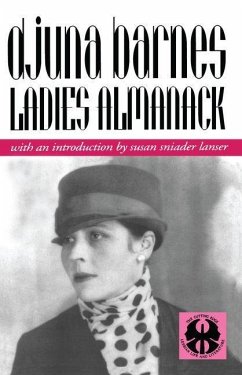"e;Lesbianism, its flories and sorows, is the subject and quest of this marvelously erverse sentimental journey by Nightwood's author... A striking lesbian mainfesto and a deft parody."e; Library JournalBlending fiction, myth, and revisionary parody and accompanied by the author's delightful illustrations, Ladies Almanac is also a brilliant modernist composition and arguably the most audacious lesbian text of its time. While the book pokes fun at the wealthy expatriates who were Barnes' literary contemporaries and remains controversial today, it seems to have delighted its cast of characters, which was also the first audience. Barney herself subsidized its private publication in 1928. Fifty of the 1050 copies of the first edition were hand colored by the author, who was identified only as a lady of Fashion: on the title page.
Dieser Download kann aus rechtlichen Gründen nur mit Rechnungsadresse in A, B, BG, CY, CZ, D, DK, EW, E, FIN, F, GR, HR, H, IRL, I, LT, L, LR, M, NL, PL, P, R, S, SLO, SK ausgeliefert werden.

